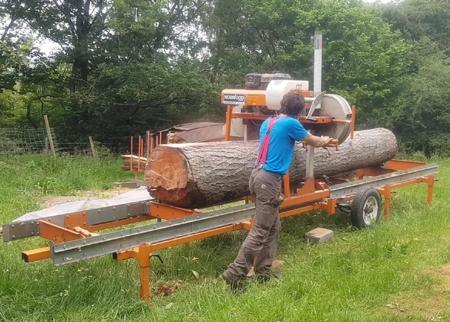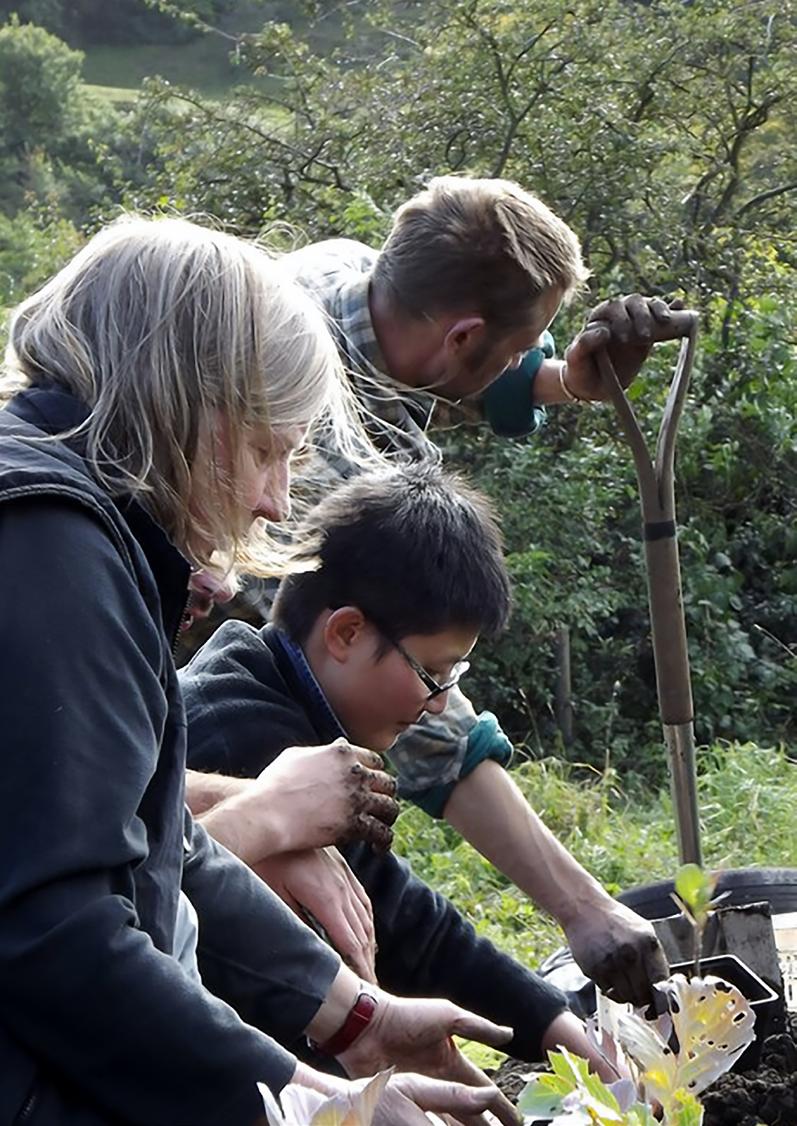
5 minute read
Looking for the helpers
By Rachel Kurtz
In 1800 the region had only 11 coal mines. By the end of the century this number had increased to 166, with a further 65 opened between 1900 – 1960 (Northern Mine Research Society). Around Durham mining was central to economic and social life with a pit in almost every village in the north of the county, so it is hardly surprising that the systematic dismantling of the industry left scars on both landscapes and communities. Decades after the closures, regeneration and renewal remain a major preoccupation. To the west of Durham city in the Deerness Valley, once home to several coal mines, an inspiring and well-established project contributes to this theme.
Advertisement
The inception of Abundant Earth workers cooperative came via the meeting of a group of students in 1990s Newcastle. A substantial group, drawn together by shared concerns around climate change and a commitment to living more sustainably, by the time they had raised enough money to buy some land, they had been whittled down to just four committed visionaries who were also romantic couples: Jo Bolton and husband Matt Whittaker and Beth Currie and her partner Wilf Richards. Despite their divergent trajectories, many of the early contributors continued their involvement by offering volunteering and practical support, along with others like myself who came a little late to the party. Twenty years on the well-established project continues to inspire and attract similarly minded individuals, generates small-scale employment, and contributes to the local community.
Abundant Earth is just 3 miles from the city centre on the outskirts of Broompark. It is easily accessed by bus or via walking or cycling along the old wagonways, a precious legacy of the mining era that now provides a green transport network across the region. The land is entered through an Exbourne gate beautifully crafted by Matt. While it might easily go unnoticed, the gate marks a transition from a throw-away culture disconnected from the meaning and worth of material things to one in which time and effort are too visible and memorable to be taken for granted. Dedicating one’s life to a project such as this requires an enormous amount of work and necessarily eclipses many other interests. For the members of this particular co-op, it also helped them develop existing skills and acquire some less obvious ones.
While Matt’s practical abilities extend to building, blacksmithing, and sheep farming, his passion is green woodworking for which he has a wellearned reputation and has won several competitions. In addition to exporting hand-turned bowls worldwide, he organises the annual Northern Bowl Gathering, which attracts an impressive array of craftspeople along with participants wanting to try their hand at carving.
The other members have similarly found their calling through the demands of the project. Matt’s wife Jo is an accomplished basket weaver. In recent years she has rented a studio in the old Catholic seminary at Ushaw and she is currently in the midst of a collaboration with other expert basket makers around the country on a refurbishment order for British clothing chain Seasalt. When she is not making baskets, Jo might also be found on the yoga mat, practicing and teaching well-woman yoga.
Wilf’s forte is organisation. Alongside his role as manager of the veg bag scheme, the majority of his work centres around permaculture – an egalitarian movement seeking to develop eco systems that nurture both people and nature. As lead permaculture teacher in the region, Wilf runs a certificated design course that helps participants understand permaculture principles and plan a project of their own, as well as working as a permaculture consultant.
Until recently Beth was the main vegetable grower, however over the last eight years a very different calling has evolved in her life. As you might imagine, with two couples working so closely together, relationships are not always easy and require honest and courageous negotiations. This led Beth to study Nonviolent Communication (NVC), a transformative framework for understanding human thoughts and behaviour and enabling more satisfying and productive relationships. Now a certified trainer, she offers workshops to a variety of groups across the region and beyond. While all of this fruit grew metaphorically but nonetheless directly from the smallholding, the cultivation of produce on the land just beyond the gate has been central to the development of the project.
Entering into the market garden there is a surprising sense of seclusion given its proximity to the cycle path. A track cuts straight through its centre, bordered on both sides by vegetable beds, polytunnels and other small buildings nestled in between the beds. The track and beds to the right are on the level, while those on the left slope gently downwards hint at the river in the valley below. Initially developed by the founding members, the garden is now run by Lauren. Having joined the co-op as an intern Lauren now manages a small team of volunteers growing for the weekly veg-bag scheme. The garden produce is supplemented with eggs from the hen house down the slope as well as some additional items from other regional organic growers. South-facing, and sheltered by trees on both sides, the site is blessed with a favourable micro-climate and this year Lauren has experimented with growing medicinal plants such as echinacea and calendula in a previously unused area.

Continuing through the garden, its far boundary is marked by another gate, beyond which the summer house overlooks an area of pasture on the way to the essential compost toilets. A recent addition, the summerhouse was donated by Fruitful Durham CIC when it ceased trading and provides a venue for courses and events for Abundant Earth members and community users. This year it has housed Jo’s well-woman yoga classes, Beth’s NVC courses and grief circles, Wilf’s permaculture design, a local meditation group and a pilates class. The pasture beyond was the venue for the Northern Bowl Gathering and I have hired it myself to run outdoor 5 Rhythms dance classes for the last two summers.
Following the track to the end of the field will bring you to Matt’s saw-mill where he can turn timber into usable planks of wood – an impressive and noisy endeavor! The area beyond this consists of ancient woodland that descends to a lower field, a flood plain for the Deerness river, which forms the land’s southern boundary. Recent recognition of the ecological importance of wetlands inspired the creation of a pond in the lower meadow, however, this is not yet completed. This area’s only productive use is for growing Jo’s basketry willow, nevertheless, I find it a very peaceful spot for some quiet time, as do the local birds - one evening last summer I sat with my daughter and watched 5 herons come to roost in a single tree!
The influence of the smallholding does not stop at its boundaries or the lives of those who visit. Abundant Earth has been involved in the Ushaw Moor Community Garden just along the road and has delivered projects for many schools and community groups over the years. In an area where pit closures have resulted in a scarred landscape and in some cases, three generations of unemployment, renewal and regeneration are a major concern and Abundant Earth is only one of the many organisations and individuals to contribute, but Durham is lucky to have them nonetheless.










